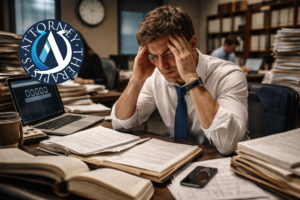Solo and small-firm attorneys face unique stressors that place them at heightened risk for anxiety, depression, and burnout. Unlike attorneys in larger firms, solo practitioners and small-firm lawyers must manage not only the legal aspects of their practice but also a host of business-related responsibilities, including financial management, marketing, IT, human resources, and compliance with ethical regulations. These compounded pressures can have significant implications for mental health and well-being, as supported by empirical studies on attorney stress and wellness.
The Unique Pressures of Solo and Small-Firm Practice
A 2016 study conducted by Krill, Johnson, and Albert in the Journal of Addiction Medicine reported that attorneys, particularly those in private practice, experience disproportionately high levels of anxiety and depression compared to other professions. The study found that 28% of attorneys struggle with depression, 19% with anxiety, and 21% with problematic alcohol use. Notably, solo and small-firm practitioners were identified as particularly vulnerable due to their workload demands and lack of institutional support.
Financial and Business Pressures
Running a small law firm or solo practice requires attorneys to be proficient not only in law but also in business operations. A 2021 survey conducted by the American Bar Association (ABA) found that small-firm attorneys frequently cite financial instability as a primary stressor. Limited financial resources mean that attorneys must often handle administrative tasks themselves, reducing billable hours and increasing workload stress. Additionally, the unpredictability of client payments and the burden of overhead expenses create ongoing financial anxiety.
Ethical and Client Pressures
Solo practitioners and small-firm attorneys must also ensure that they maintain high ethical standards while juggling multiple roles. Unlike larger firms with dedicated compliance officers, smaller firms require attorneys to personally oversee issues such as client confidentiality, conflicts of interest, and malpractice risks. The pressures of maintaining ethical compliance while ensuring client satisfaction can create an environment of chronic stress.
A 2020 report by the Institute for the Advancement of the American Legal System (IAALS) found that small-firm practitioners often experience moral distress when attempting to balance zealous client advocacy with economic constraints. The fear of disciplinary action from bar associations, combined with financial pressures, exacerbates mental health challenges.
Isolation and Lack of Support
Another significant challenge faced by solo and small-firm attorneys is professional isolation. Unlike their counterparts in larger firms who benefit from team collaboration, solo practitioners often lack a built-in support network. This isolation can contribute to feelings of loneliness and emotional exhaustion, which, in turn, increase susceptibility to mental health disorders. The 2018 State of the Legal Profession Report by the ABA noted that 63% of solo practitioners reported feeling isolated in their practice, a factor linked to higher levels of depression and substance abuse.
Strategies for Mitigating Stress and Improving Well-Being
Given these documented challenges, addressing the mental health crisis among solo and small-firm attorneys requires both systemic changes and individual interventions.
Institutional Reforms
Financial and Business Support: Bar associations and legal organizations should expand resources such as business management training and financial planning assistance tailored for solo practitioners.
Mental Health Programs: Enhanced mental health resources, including confidential therapy and peer support networks, should be made more accessible to small-firm attorneys.
Ethical Guidance and Malpractice Protection: State bar associations should provide more proactive guidance on ethical compliance and offer affordable malpractice insurance to alleviate stress related to professional responsibility.
Individual Coping Strategies
Time Management and Delegation: Utilizing legal technology and outsourcing administrative tasks can alleviate workload pressures.
Building a Professional Network: Participating in local bar associations, mentorship programs, and attorney support groups can reduce isolation.
Self-Care and Wellness Practices: Regular exercise, mindfulness practices, and setting clear work-life boundaries can help mitigate the effects of chronic stress.
Conclusion
The unique stressors faced by solo and small-firm attorneys create a precarious environment for mental health. Financial strain, ethical obligations, business responsibilities, and professional isolation contribute to disproportionately high levels of anxiety and depression among these practitioners. Addressing this crisis requires a multi-faceted approach that includes institutional support, enhanced mental health services, and proactive coping strategies. Without such interventions, the legal profession risks not only the well-being of its practitioners but also the quality and sustainability of legal services provided to the public.








